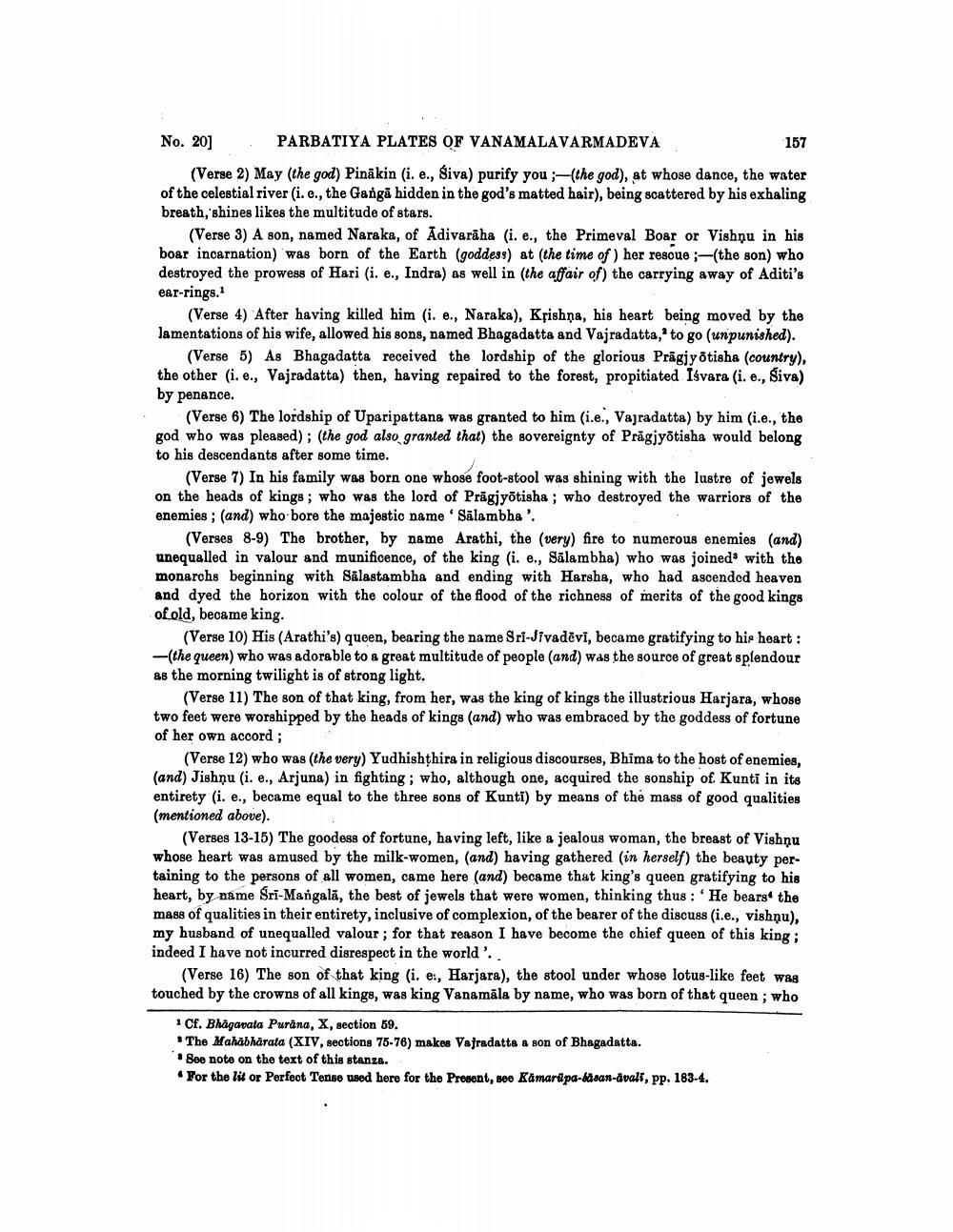________________
No. 20]
PARBATIYA PLATES OF VANAMALAVARMADEVA
157
(Verse 2) May (the god) Pinäkin (i. e., Siva) purify you :-(the god), at whose dance, the water of the celestial river (i.c., the Gangā hidden in the god's matted hair), being scattered by his exhaling breath, shines likes the multitude of stars.
(Verse 3) A son, named Naraka, of Adivarāha (i. e., the Primeval Boar or Vishnu in his boar incarnation) was born of the Earth (goddess) at the time of her resoue:-(the son) who destroyed the prowess of Hari (i. e., Indra) as well in the affair of the carrying away of Aditi's ear-rings."
(Verse 4) After having killed him (i. e., Naraka), Krishna, his heart being moved by the Jamentations of his wife, allowed his sons, named Bhagadatta and Vajradatta,' to go (unpunished).
(Verse 5) As Bhagadatta received the lordship of the glorious Prāgjyotisha (country), the other (i. e., Vajradatta) then, having repaired to the forest, propitiated Isvara (i. e., Siva) by penance.
(Verse 6) The lordship of Uparipattana was granted to him (.e., Vajradatta) by him (i.e., the god who was pleased); (the god also granted that) the sovereignty of Pragjyotisha would belong to his descendants after some time.
(Verse 7) In his family was born one whose foot-stool was shining with the lustre of jewels on the heads of kings; who was the lord of Prāgjyotisha ; who destroyed the warriors of the enemies ; (and) who bore the majestic name 'Salambha'.
(Verses 8-9) The brother, by name Arathi, the (very) fire to numerous enemies (and) unequalled in valour and munificence, of the king (i. e., Sālambha) who was joined with the monarchs beginning with Sālastambha and ending with Harsha, who had ascended heaven and dyed the horizon with the colour of the flood of the richness of merits of the good kings of old, became king.
(Verse 10) His (Arathi's) queen, bearing the name Sri-Jivadevi, became gratifying to his heart : -(the queen) who was adorable to a great multitude of people (and) was the source of great splendour as the morning twilight is of strong light.
(Verse 11) The son of that king, from her, was the king of kings the illustrious Harjara, whose two feet were worshipped by the heads of kings (and) who was embraced by the goddess of fortune of her own accord ;
(Verse 12) who was the very) Yudhishthira in religious discourses, Bhima to the host of enemies, (and) Jishņu (i. e., Arjuna) in fighting ; who, although one, acquired the sonship of Kunti in its entirety (i. e., became equal to the three sons of Kunti) by means of the mass of good qualities (mentioned above).
(Verses 13-15) The goodess of fortune, having left, like a jealous woman, the breast of Vishņu whose heart was amused by the milk-women, (and) having gathered (in herself) the beauty pertaining to the persons of all women, came here (and) became that king's queen gratifying to his heart, by name Sri-Mangalā, the best of jewels that were women, thinking thus: 'He bears the mass of qualities in their entirety, inclusive of complexion, of the bearer of the discuss (i.e., vishņu), my husband of unequalled valour; for that reason I have become the chief queen of this king : indeed I have not incurred disrespect in the world'. .
(Verse 16) The son of that king (i. e., Harjara), the stool under whose lotus-like feet wag touched by the crowns of all kings, was king Vanamāla by name, who was born of that queen ; who
1 Cf. Bhagavata Purana, X, section 59. * The Mahabharata (XIV, sections 75-76) makes Vafradatta a son of Bhagadatta. * See note on the text of this stanza. . For the lit or Perfeot Tense used here for the Present, see Kamardpa-tasan-ävalt, pp. 183-4.




